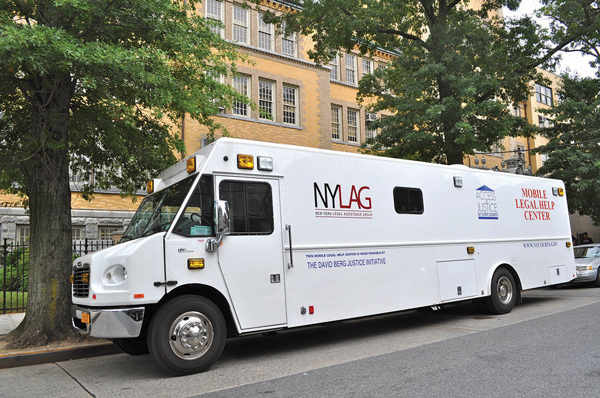
BY ZACH WILLIAMS | Amobile legal advice unit will pull into the Lower East Side and Chinatown this month to help residents facing tenant issues and beyond.
Community members can access the fully equipped and staffed vehicle on Fri., Aug. 22, at Seward Park Library and at the Chinese Consolidated Benevolent Association on Mon., Aug. 25.
From 10 a.m. until 3 p.m. on both these days, advice on a wide range of legal topics will be available under the service, which is jointly run by the New York Legal Assistance Group and the New York State Courts Access to Justice Program. Spanish and Chinese interpreters will be at the ready.
“You can see the scope of this is vast. Whatever your needs are, tell us,” said C.C.B.A. President Eric Ng, speaking in Mandarin at an Aug. 19 press conference announcing the upcoming events.
The two neighborhoods have long been magnets for new immigrants, both those with and without legal status. However, at the same time, real estate development has been fueling conflict between longtime rent-regulated tenants and landlords.
Legal advice on public benefits, disability benefits, consumer credit, custody, employment and identity theft will also be available.
Councilmember Margaret Chin secured $5,000 through the City Council to fund the two events.
“Access to legal services is a fundamental community need,” Chin said. “But too many Chinatown and Lower East Side residents struggle to afford necessary legal help, especially on difficult housing issues.”
Known as the Mobile Legal Help Center, the 41-foot-long vehicle has powered a mission to provide legal services to low-income individuals ever since it was first commissioned in 2012, according to the NYLAG Web site. Appointments are recommended through the vehicle’s complicated handle: mobilelegalhelpcenter.acuityscheduling.com.
The imposing vehicle can accommodate 17 people at once, with interview rooms and all the fixings of a modern office. High-tech gadgetry can virtually connect with judges in order to secure legal action in emergencies such as unlawful evictions and domestic violence protection.
Once the paperwork travels back and forth, and a judge interviews the litigant, an order arrives via fax machine. The litigants can walk away with a copy of the order, according to NYLAG.
If the expert attorneys in the field are stumped, there is plenty of reserve legal power, according to Amy Hozer, NYLAG supervising attorney.
“We guarantee everybody advice and counsel when they come on board, as long as it is an area that NYLAG covers and that there is no conflict in giving you that advice,” she said.
These two stops are part of the mobile program’s goal of serving 2,000 New Yorkers annually arose after Ng saw the unit operating in Flushing, Queens, he said. Soon he got in touch with Chin, who took up the cause, he added.
The need for legal advice extends to relatively mundane issues for recent immigrants, said Karlin Chan, a member of Community Board 3. For example, acquiring a peddler’s license can be difficult when the applicant does not speak English or understand the regulations.
The cost of private legal counsel also precludes many new immigrants from accessing the right information, according to Chan.
“This is free legal advice, or if there is a case they’ll take the case pro bono,” he said. “You go see a shyster lawyer, the guy will charge you $250, $300 for consultation, and then they’ll hit you with, ‘Yeah, we’ll take care of that.’ Then, boom — a year later, two years later, you’re back to square one. Nothing’s been done.”































